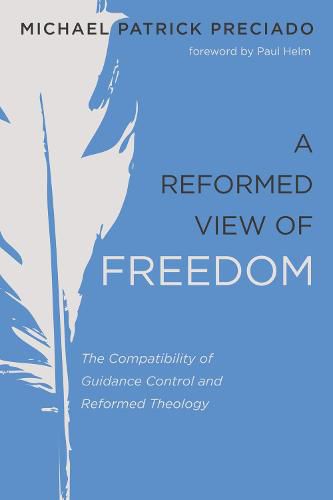Readings Newsletter
Become a Readings Member to make your shopping experience even easier.
Sign in or sign up for free!
You’re not far away from qualifying for FREE standard shipping within Australia
You’ve qualified for FREE standard shipping within Australia
The cart is loading…






This title is printed to order. This book may have been self-published. If so, we cannot guarantee the quality of the content. In the main most books will have gone through the editing process however some may not. We therefore suggest that you be aware of this before ordering this book. If in doubt check either the author or publisher’s details as we are unable to accept any returns unless they are faulty. Please contact us if you have any questions.
Reformed Christians do not believe in free will. This is a common assertion today and it is completely false. The Reformed tradition does advocate free will, just not libertarian free will. A Reformed View of Freedom: The Compatibility of Guidance Control and Reformed Theology explains how the Reformed tradition articulated its view of human freedom and moral responsibility in terms of rational spontaneity. It shows how the Reformed view of rational spontaneity is compatible with contemporary compatibilist and semi-compatibilist views, especially that of guidance control. This work addresses a number of pressing issues in the current academic climate. Is Reformed theology theological determinism? Is it compatibilism? Did Jonathan Edwards part ways with the Reformed tradition? What is the relationship between Reformed theology and contemporary compatibilist and semi-compatibilist positions in analytic philosophy? This book addresses these questions by exegeting the classic Reformed confessions, catechisms, and Reformed scholastics. It sets them in relation to contemporary analytic philosophy. It is an exercise in analytic theology. The reader will come away with a better understanding of how the Reformed viewed free will and moral responsibility in light of contemporary analytic philosophy.
$9.00 standard shipping within Australia
FREE standard shipping within Australia for orders over $100.00
Express & International shipping calculated at checkout
This title is printed to order. This book may have been self-published. If so, we cannot guarantee the quality of the content. In the main most books will have gone through the editing process however some may not. We therefore suggest that you be aware of this before ordering this book. If in doubt check either the author or publisher’s details as we are unable to accept any returns unless they are faulty. Please contact us if you have any questions.
Reformed Christians do not believe in free will. This is a common assertion today and it is completely false. The Reformed tradition does advocate free will, just not libertarian free will. A Reformed View of Freedom: The Compatibility of Guidance Control and Reformed Theology explains how the Reformed tradition articulated its view of human freedom and moral responsibility in terms of rational spontaneity. It shows how the Reformed view of rational spontaneity is compatible with contemporary compatibilist and semi-compatibilist views, especially that of guidance control. This work addresses a number of pressing issues in the current academic climate. Is Reformed theology theological determinism? Is it compatibilism? Did Jonathan Edwards part ways with the Reformed tradition? What is the relationship between Reformed theology and contemporary compatibilist and semi-compatibilist positions in analytic philosophy? This book addresses these questions by exegeting the classic Reformed confessions, catechisms, and Reformed scholastics. It sets them in relation to contemporary analytic philosophy. It is an exercise in analytic theology. The reader will come away with a better understanding of how the Reformed viewed free will and moral responsibility in light of contemporary analytic philosophy.